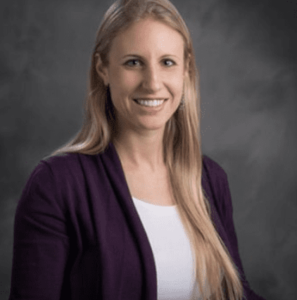Huff named director of Clemson Wood Utilization + Design Institute
May 28, 2024Emily Huff, associate professor of human dimensions of forestry at Michigan State University, has been named director of Clemson University’s Wood Utilization + Design Institute (WU+D).
Huff takes over leadership of the WU+D Institute after a national search followed the retirement of Patricia Layton, the Institute’s founding director.
The directorship — formally titled the Patricia “Pat” Layton Endowed Directorship — is named in honor of Layton and was endowed with a $2 million gift from Micky and Amy Scott, fourth-generation owners of Collum’s Lumber Products, L.L.C.
Huff will begin as director of the WU+D Institute Summer 2024.
“The Institute has done a remarkable job thus far, and I’d like to continue the trajectory of solving multiple challenges at the same time. Those challenges include cultivating markets for materials that help us sustainably manage our forests for health and resilience, while simultaneously decarbonizing a diverse range of products,” Huff said.
While at MSU, Huff’s research focused on the integration of social and ecological data to predict effects of human behavior on forest ecosystems and measuring the influence of resource quality and availability on decision-making. She also serves as Co Editor-in-Chief of the journal Society & Natural Resources and as President of the Michigan Forest Association.
Prior to her time at MSU, Huff filled academic, governmental and non-governmental roles, including research forester for the U.S. Forest Service, research assistant for the Sustainable Working Landscapes Initiative and technical intern with Sandia National Laboratories.
Huff earned her Ph.D. in Forestry from the University of Maine.
“I am delighted to have Emily join us at the WU+D Institute. She brings a strong forestry background along with a fresh perspective on the relationship among forest management, healthy forests and forest markets,” Layton said.
“By creating innovation in forestry, construction and wood product development, the WU+D Institute has played a vital role in Clemson’s land-grant mission and strategic vision to transform the lives of South Carolinians by fostering prosperity through enhanced economic opportunity. I know Emily will continue pushing the Institute to accomplish great things,” said Mark S. Richardson, WU+D Institute board chair and Clemson University Trustee.
Since its inception in 2014, the WU+D Institute has combined Clemson’s expertise in Forestry, Architecture, Construction Science and Civil Engineering to innovate and advocate for the expanded use of engineered sustainable wood-based materials, such as cross-laminate timber (CLT), in a commercial construction market dominated by steel and concrete.
“Pat Layton started the Wood Utilization + Design Institute with the idea to create a place where experts in forestry, architecture and manufacturing could collaborate to create new markets and design new building products with wood. Now, the Institute is a vital part of Clemson and an example to the state and region. I am confident that the transition to Emily’s leadership will be seamless, and she will continue the great strides that WU+D has made,” said Greg Yarrow, interim dean of Clemson’s College of Agriculture, Forestry and Life Sciences.
Huff sees the Institute serving as a regional and national example for how to create a nexus of disciplines designed to tackle challenges at a national scale, such as the U.S. Forest Service’s recent 10-year, $500-million initiative addressing the wildfire crisis in the places where it poses the most immediate threats to communities.
“A big part of that strategy is finding a home for all the wood that’s coming off Federal Forests for fuel treatment purposes. So not only is the WU+D Institute solving a problem for South Carolina, but it’s developing models, processes and products that can be replicated broadly, nationally,” Huff said.
Huff also sees the forestry industry supporting healthy rural communities by strengthening the entire forestry supply chain.
“By providing markets, we’re ensuring that the communities that live in and around these forests are also robust and healthy. The Institute can support a sustainable workflow for the entire sector. In that way, we’re contributing to the state’s overall long term, economic health and prosperity beyond 20, 30, 40-year forest rotations,” Huff said.
Joining Huff will be husband, Andrew; 4-year-old son, George; and German shorthair pointer hunting dogs, Wilco and Zelda.














